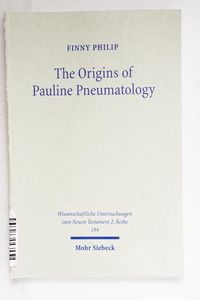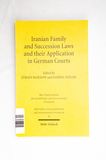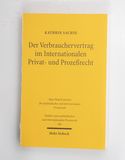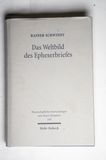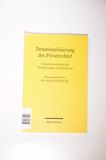
The Origins of Pauline Pneumatology: The Eschatological Bestowal of the Spirit upon Gentiles in Judaism and in the Early Development of Pauls ... ... Untersuchungen zum Neuen Testament 2. Reihe) - Philip, Finny
Netto: 32.93 €35,23€
inkl. MwSt. zzgl. Versand
Bearbeitungszeit: 3 Werktage
Sofort lieferbar (auf Lager)
1x Stück verfügbar
Buchzusammenfassung:
Finny Philip inquires into Pauls initial thoughts on the Holy Spirit. Pauls conviction that he was called to be an apostle to the Gentiles and that God bestowed the Spirit upon the Gentiles apart from Torah obedience is the basis for any inquiry on this subject. Central to Philips argument is Pauls conviction that God graciously endowed his Gentile converts with the gift of the Spirit, an understanding that is rooted primarily in his conversion experience and secondarily in his experience with and as a missionary of the Hellenistic community in Antioch. In examining the range of expectations of the Spirit that were present in both Hebrew scripture and in the wider Jewish literature, the author comes to the conclusion that such a concept is rare, and that it is usually the covenant community to which the promise of the Spirit is given. Furthermore, Pauls own pre-Christian convictions about the Spirit, a result of his own self-perception as a Pharisee and persecutor of the church, display continuity between his thought patterns and those of Second Temple Judaism. Pauls Damascus experience was an experience of the Spirit. His experience of the glory of God in the face of Jesus Christ (2 Cor. 3:1-4:6) provided him with the belief that there was now a new relationship with God, which was possible through the sphere of the Spirit. In addition, Paul was influenced by the Hellenists, whose theological beliefs included the perception of the church as the eschatological temple in which the Spirit of God is the manifest presence of God. It is in these notions that one may trace the origins of Pauls thoughts on the Holy Spirit.
FAQ zum Buch
Paul war in der Vorgeschichte seiner Christenverfolgung mit der Gruppe um Stephanus verbunden, die als pneumatisch (geistlich) aktiv galt. Die Verfolgung dieser Gruppe durch Paulus wird im Text als Teil seines früheren Wirkens beschrieben. Die pneumatischen Aktivitäten der Gruppe um Stephanus standen im Zusammenhang mit der Verfolgung durch Paulus, die zur Verbreitung des Evangeliums führte. Die genaue Beziehung zwischen Paulus Verfolgungstätigkeit und den geistlichen Aktivitäten Stephanus bleibt jedoch im Text vage. Dieses FAQ wurde mit KI erstellt, basierend auf der Quelle: S. 152, ISBN 9783161485985
Die Forschung behandelt die Assoziation von πνευμα mit der eschatologischen Erneuerung des Volkes und der Landes in der Septuaginta. Zentrale Themen sind die Rolle der Empfänger, die Auswahl von Verben und textuelle Abweichungen in bestimmten Passagen. Weiterhin wird die Veränderung der Rezeption von Strafe und Gnade in der Übersetzung analysiert. Die Untersuchung umfasst auch die Konsequenzen dieser Textänderungen für die theologische Botschaft. Dieses FAQ wurde mit KI erstellt, basierend auf der Quelle: S. 92, ISBN 9783161485985
Philo betont in seiner Diskussion über εὐγενεία vor allem moralische und ethische Aspekte, nicht jedoch rhetorische Fähigkeiten. Er kritisiert zudem oratorische Fähigkeiten, wie in Virt. 213 erwähnt. Dieses FAQ wurde mit KI erstellt, basierend auf der Quelle: S. 126, ISBN 9783161485985
Der Begriff „προέκκεκτος“ (proekekktos) bezeichnet Paulus Fortschritt in der jüdischen Tradition und betont einen stetigen Prozess der moralischen und geistigen Entwicklung. Er zeigt, dass Paulus sich über viele seiner Zeitgenossen hinaus in seiner jüdischen Bildung und Praxis bewegte, wie in Galater 1,14 erwähnt wird. Dieses FAQ wurde mit KI erstellt, basierend auf der Quelle: S. 141, ISBN 9783161485985
Die Zeal in Pauls vorchristlicher Zeit wurde als Loyalität gegenüber den Traditionen der Väter beschrieben, insbesondere den Lehrmeinungen und Praktiken der pharisäischen Traditionen des Zweiten Tempels, nicht als politische oder gewalttätige Haltung. Dieses FAQ wurde mit KI erstellt, basierend auf der Quelle: S. 142, ISBN 9783161485985
Der Text nennt mehrere biblische Passagen, darunter Römer 5,5; 7,6; 8,2, 9, 14, 15; 1. Korinther 1,4-9; 6,9-11; 12,13; 2. Korinther 1,22; 3,3, 17; Galater 3,1, 5, 14; und 1. Thessalonicher 1,5. Diese Stellen werden als Belege für Paulus Überzeugung zitiert, dass der Heilige Geist auch den Heiden zuteilwurde. Dieses FAQ wurde mit KI erstellt, basierend auf der Quelle: S. 38, ISBN 9783161485985

